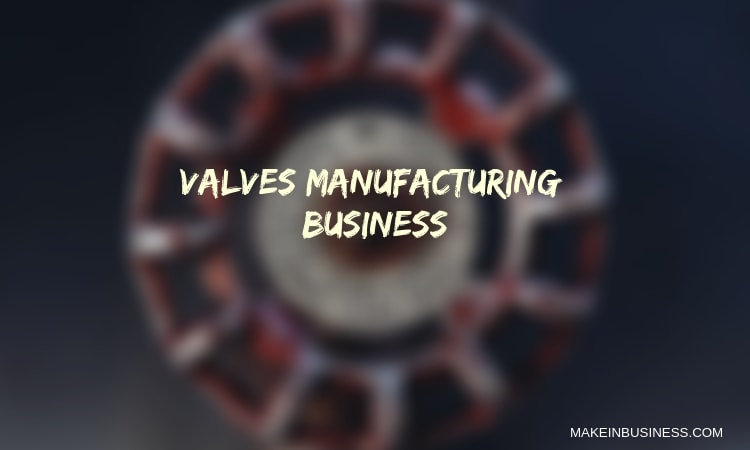How to Get into Valves Manufacturing Business

A valve is one such device that is known for regulating, directing or controlling a fluid flow. It opens, closes or partially obstructs different passageways. Technically these are fittings. In any open valve, a fluid will be flowing in one direction from any higher to lower pressure. The simplest valve is a flap that is freely hinged and drops for obstructing fluid flow in a particular direction. But it is pushed to open up by the flow in the other direction. It is known as check valve because it will prevent or check the fluid flow in a direction.
The modern control valves will be regulating pressure and flow downstream as well as operating on well-known automation system. It has different types of uses such as water control for irrigation, industrial usage for controlling process, residential usage like on and off and control of pressure to dish as well as cloth washers along with taps in home.
Valves are also of great use in military as well as transport sectors. There are many new companies coming up the market who show great interest of investing in the valve manufacturing business. Valve suppliers in Asia have their ranks increased. In the recent years many latest Indian companies have been seen in the valve manufacturing market. Within the country’s flourishing economy, those companies are able to meet the fast growing demand for industrial valves.
Also read:- 20 Profitable Manufacturing Business Ideas With Low Investment
Learn about the basis of the valves manufacturing business
Starting such a business may look to be risky as well as complicated. For people who have no idea on the way of starting a valve manufacturing business, make use of few tips that will be beneficial for you and the business. At first you need a good planning to start with. You need to consider all irrespective of whether it looks great for the business or not. After the planning is done, you can easily get rid of each and every unnecessary thing.
After that you need to create an excellent marketing strategy. Since the type of business in which you will be investing revolves only around valves, you will definitely have various competitors. There will be few marketing strategy and technique that will be used by many companies. So you should come up with some new and innovative strategies. Be aware of the trends in the market that will affect your business. If anything wrong occurs, manage it calmly.
Take care of few things when starting this business
In this business world competition is very normal. Some businesses are seen to lease their services along with products. But you should not do the same. Rather try to make one innovative plan for your business that will improve your sales as well as popularity in various locations.
You might feel a bit worried in the beginning. But accept it as a challenge and you will be able to improve your products and services. The economy is unstable. So get prepared for unexpected risks when you start implementing this valve manufacturing business.
What should you consider if starting a valve manufacturing business?
You require considering several things when you start your valve manufacturing business. Budget is the first thing that you should consider. On the basis of a specific situation, a valve manufacturing business’s budget will vary. If you wish to keep your budget low, then do not hire several personnel. But hiring employees is required for this type of business. You can begin with hiring some employees and hire them only if it is needed.
You also need to consider the location. It is a big business so it will need a huge space for operating. Look out for such a place that will be able to accommodate this kind of a business. Ensure that the equipment will be fitting well there. You should also consider the environment and make sure that the valve manufacturing business’s nature blends well on the place’s environment.
Other than these, manufacturing as well as inspecting process of a belimo valves is much complicated. You require proper guidance for a well-skilled person. Installation of the components of valve on the sheet of the machinery is also tough. You need to perform it accordingly with some specified tools in order to ensure that high standard quality is also maintained. But the latest technologies along with well working tool and material as well as latest machinery equipment will aid you to get out of any difficult situation.
So you can see that the valve manufacturing industry involves many complicated process and thus it is different from any other business. Moreover the benefits bought in by the valve manufacturing industry are greater and so many people are showing interest in the business. Take care of the above mentioned tips and start with this popular business successfully.
FAQS
A valve is a device that regulates, guides, or controls the flow of a fluid (gases, liquids, fluidized solids, or slurries) by opening, closing, or partially obstructing passage through a passageway. Valves are technically fittings but are usually discussed as a separate category. In an open valve, fluid flows in a direction from higher pressure to lower pressure. Valves are used in a variety of applications ranging from residential to industrial and from recreational to military and space.
Valves come in a wide variety of types, sizes, and pressure ratings. The most common types are globe valves, ball valves, gate valves, butterfly valves, plug valves, needle valves, check valves, relief valves, safety valves, and diaphragm valves. Each type of valve has its own specific purpose and design considerations.
Manufacturing valves can help to reduce downtime and increase productivity. This is done by controlling the flow of liquids and gases to reduce the risk of leaks and other issues that can cause system breakdowns. Valves are precision-machined and offer more reliable performance than manually operated valves that tend to become unreliable over time. Additionally, valves have the capability to be customized to meet the needs of any industry, making them a cost-effective choice for installations in a variety of industries.
Valves are typically made from a variety of materials, such as metal, plastic, and rubber. Depending on the application, manufacturers may use different manufacturing techniques, such as machining, molding, or drilling. After the valves are manufactured, they are then tested and shipped to the customer.
Alloy steel and cast iron are some of the most commonly used materials for valve manufacturing. Alloy steels are preferred due to their higher strength and corrosion resistance. Cast iron is also used for applications that require higher pressure and temperature resistance. Other materials used for valve manufacturing include bronze, brass, aluminum, and plastics.
Owning a valve manufacturing business comes with many advantages. Valves are not something that most consumers buy often, so having a steady demand from industrial clients is an advantage. Additionally, having an extensive catalog of products in different sizes, pressure ratings, and materials is also beneficial. Additionally, owning a valve manufacturing business gives you more control over the quality and cost of your products.
Process valves are used to control the flow of chemicals or liquids in an industrial process, while Instrumentation valves are used to measure, monitor and control various parameters of a process. Process valves typically have larger size ports, while instrumentation valves tend to be much smaller. Additionally, process valves are made of industrial grade materials and are designed to withstand high-pressure applications, while instrumentation valves are designed for lower pressure applications.
Manufacturing valves and installing them safely is essential to reduce the risk of future accidents. It’s important to follow strict safety procedures when constructing valves, such as ensuring the valves have all necessary components, properly sealing all openings, and performing required testing. Additionally, when installing valves, it’s essential to make sure to use the correct type and size for the application and to use the correct tools for installation.
The life expectancy of valves depends on several factors, including the size and type of valve, the environment in which the valve is installed, and how the valve is maintained. While some valves may last longer than expected, they will eventually wear out, leading to a need to replace them. Proper maintenance of valves can help to extend their life, but it is inevitable that the valves will eventually need to be replaced.
Valves vary significantly in price depending on their type and size. Generally, standard valves are more cost-effective, while customized valves are more expensive. Additionally, the materials used to manufacture valves can significantly affect the cost, as different materials have different costs associated with them. It’s important to understand the different factors that contribute to the cost of valves in order to make an informed decision about purchasing valves.






